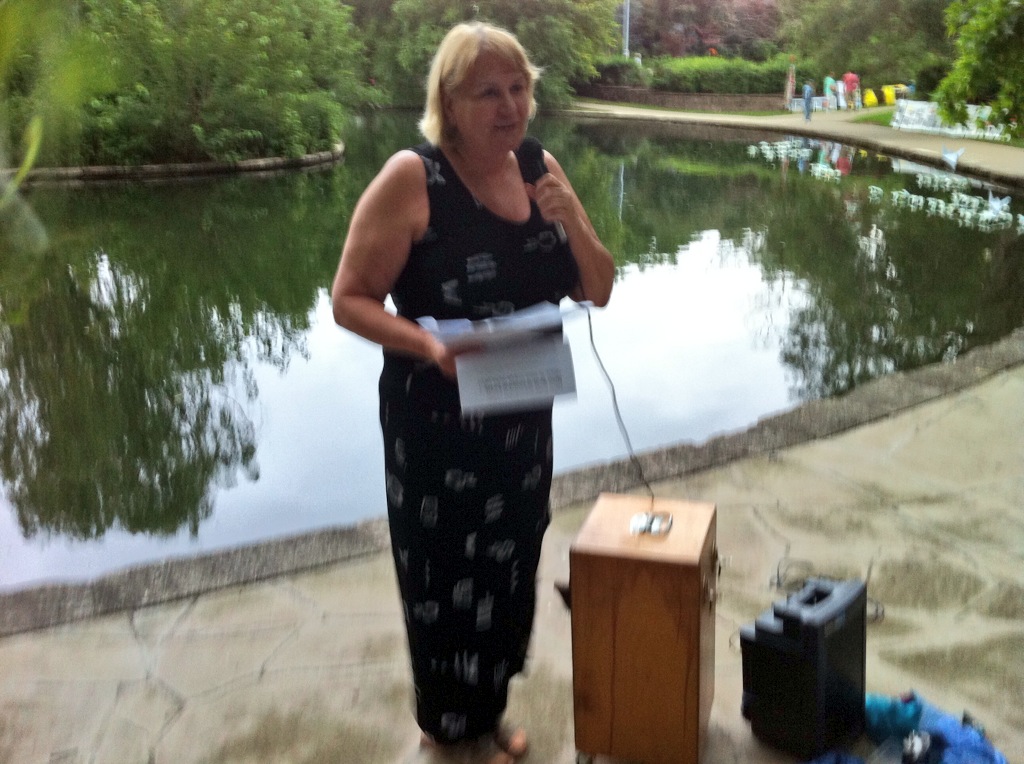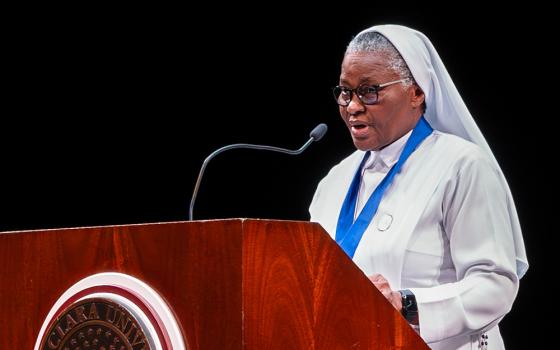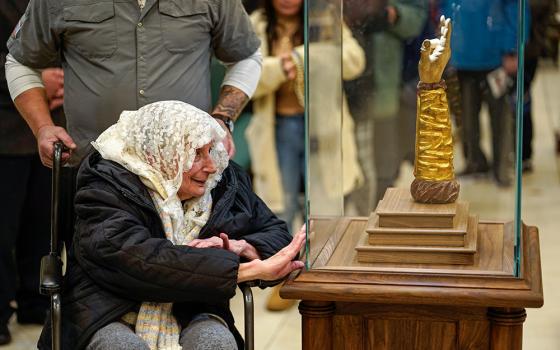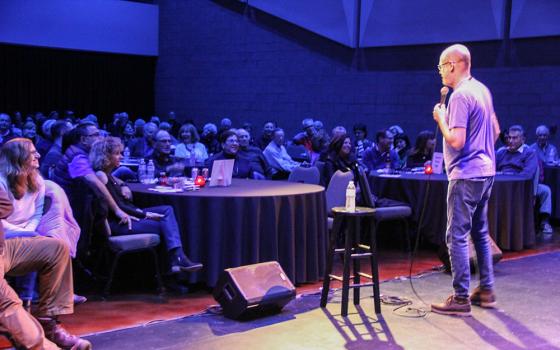
Ann Suellentrop addresses peace gathering
Tōrō nagashi is the Japanese ceremony in which participants float paper lanterns. This is done based on the belief that this guides the spirits of the departed back to the other world. The ceremony is also done by many peace communities to commemorate those lost in the bombings of Hiroshima and Nagasaki on Aug. 6 and 9, 1945.
Those US bombings were the only times nuclear weapons were ever used on human targets. Within the first two to four months of the bombings, the acute effects killed 90,000–166,000 people in Hiroshima and 60,000–80,000 in Nagasaki, with roughly half of the deaths in each city occurring on the first day.
In Kansas City, peace activists gather one evening during the first week of August to float lanterns in a pond in Loose Park to commemorate those deaths.
Last night several dozen once again gathered to remember those who died under the unfathomable fire of nuclear weapons. The gathering, as it always does, reaches globally to let the human family know that in the middle of the heartland of the United States, some people remember and call out against the building, storage and use of these weapons of mass destruction.
The Kansas City peace community, ecumenical in scope and anchored by Catholic Worker activists, has attempted for years to keep a focus on the construction of nuclear weapons, as 85 percent of the components of these weapons are build here in a plant that has polluted the local ground water and environment to such a degree it is being moved to another location several miles to the south.
Many peace activists have spoken out against the building of the new plant. Repeatedly they come from various parts of the country to the new plant where they “cross the line” and allow themselves to be arrested as a visible sign of protest. It is all done non-violently.
President Obama has called for the elimination of all nuclear weapons. It is an elusive goal, especially so when billions are being poured into the construction of a new plant that will continue to build these weapons decades into the future.
One of the principal voices speaking out against the plant is a Catholic healthcare worker whose passion for years has been to draw attention to the immediate health dangers the current nuclear parts plant causes to it workers and to the larger community.
Anne Suellentrop spoke once again at the lantern floating ceremony Aug. 4. Her words are worth pondering. A small voice today, decades from now she will be revered for drawing attention of foolishness, hypocrisy and immorality.
I've been working on the nuclear issue since 2008 for PeaceWorks - KC and Physicians for Social Responsibility - KC. Here are some of the things I've learned about nuclear weapons:
Manufacturing nuclear weapons damages our health and environment now. It has polluted every major river in the U.S., which is the source of our drinking water.
The KC Plant is currently being assessed for specific hazards by EPA (Environmental Protection Agency) and the Missouri Department of Natural Resources. There are already 14 known superfund sites at the Bannister Federal Complex with almost 900 toxins! The KC Plant is located on a flood plain next to two rivers in a residential neighborhood. I wonder how can we trust that the government to clean this up?
Nuclear weapons do not make us safe. They are still on high alert, a forgotten danger. They could destroy all major cities in the world in a half hour.
Nuclear war is an outdated strategy.
Nuclear weapons are toxic to manufacture. These are hazardous jobs; workers may not make it to retirement and/or they may suffer from serious, chronic health issues.
They are always saying they're good, high-paying jobs, but they're not! There are hundreds of thousands of sick and dying nuclear workers. The Department of Labor (DOL) administers the Energy Employees Occupational Illness Compensation Program (EEOICPA). Begun in 2001, the program tends to deny, deny, and deny claims until the worker dies.
Nuclear weapons are an extravagant waste of our tax money and resources. They are not good for our economy; they are an unusable, unsustainable product. We could use those resources for (since I'm a nurse) medical research and health care.
Nuclear weapons are immoral. Many world religions have made statements condemning nuclear weapons.
There is a growing international, as well as national, movement to ban nuclear weapons. The majority of people worldwide want to get rid of them.
A new process has been established by the United Nations,”Open Ended Working Group to Take Forward Multilateral Nuclear Disarmament Negotiations" (OEWG); it met in May for the first time. It sponsored the "Open the Door to a Nuclear Free Future" campaign that inspired us to use the symbol of the door in our July 13 action at the KC Plant.
The International Campaign for the Abolition of Nuclear Weapons hosted diplomats from 127 countries who met in Oslo, Norway March 4-5 to examine the catastrophic effects of nuclear weapons. ICAN held a Civil Society Forum to build support for the ban alongside the diplomats' meeting.
I would like to attend the next one in Mexico. ICAN sponsored Nuclear Abolition Week July 6-13, which our July 13 action was part of. ICAN is also sponsoring the "Share Your Shadow" campaign, where people are encouraged to take a picture of their shadow and send it in. I'm planning on tracing my shadow with black chalk on the sidewalk in front of Zimmer Realty (which owns the new KC nuclear bomb plant) and in from of City Hall and JE Dunn (the construction company which built the new KC nuclear bomb plant), along with an appropriate phrase such as "KC Out of the Nuclear Weapons Business"! Should be fun!
The International Red Cross and Red Crescent Movement are calling for the elimination of nuclear weapons.
The United States Conference of Mayors calls for US Leadership in global elimination of nuclear weapons and redirect nuclear weapons spending to meet the urgent needs of cities.
United for Peace and Justice is a U.S. group that has designated August as “Nuclear-Free Future” month – a month of education and action for a world free of nuclear weapons
Everyone can do something. Join a group, become informed, write a letter to the editor, call your congressperson, speak up and participate in demonstrations, support elected officials who are doing something.
I'd also like to briefly draw the connection between nuclear weapons and nuclear power. They are inextricably linked, because plutonium, used in nuclear bombs, is produced from uranium, which is exactly what a nuclear power plant does. So countries that want nuclear weapons have a clear path to make nuclear weapons. There are 40 countries in the Middle East right now that are thinking about making nuclear weapons.
Kansas City is surrounded by nuclear power plants: Wolf Creek is 100 miles southwest of Kansas City; the Callaway Plant is in Missouri; and there are two nuclear power plants upstream from Kansas City near Omaha, Nebraska, which were threatened by flood waters last year. And of course, we are in tornado alley, and they often travel in a northeasterly direction.
I've recently learned that Wolf Creek has the worst safety record out of all the 100 or so nuclear power plants in the U.S. It's had four major safety incidents in the last three years, and the NRC has sent an investigative team to find out what is causing the problems.
Also, the man-made lake that Wolf Creek uses to cool its nuclear plant has been polluted with radioactive tritium to 25,000 pico-curies per liter, up to the limit allowed, according to David Lochbaum, a top U.S. authority on nuclear power. He himself worked in the nuclear energy industry for 17 years. He says that it's not a question of "if" power plants will be shut down, but "when". He advises local authorities to plan for that future and to transform the jobs to other work. This is what PeaceWorks did when we convinced the City Council in Kansas City to say they would plan for future jobs when the KC nuclear weapons plant shuts down, however there is no timetable for when they will do this planning.
And lastly, I would like to tell you about a woman named Joanna Macy and something she's developed, called a "Nuclear Guardianship Ethic". It is basically a bill of nuclear human rights for future generations. I went to a workshop she gave a couple years ago. She talked about plutonium as "poison fire" and said it endangers the future because radioactive materials will be deadly for thousands of generations and millions of years. Future generations have a right to live healthy lives and to have a world left to them in a livable condition.
So I invite you to ponder ideas in the Nuclear Guardianship Ethic and make them your own. Joanna says everyone on earth must become nuclear guardians.
1. Each generation shall endeavor to preserve the foundations of life and well being for those who come after. To produce and abandon substances that damage following generations is morally unacceptable.
2. Given the extreme toxicity and longevity of radioactive materials, their production must cease. The development of safe, renewable energy sources and non-violent means of conflict resolution is essential to the health and survival of life on Earth. Radioactive materials are not to be regarded as an economic or military resource.
3. We accept responsibility for the radioactive materials mined and produced for our alleged benefit.
4. Future generations have the right to know about their nuclear legacy and the dangers it brings.
5. Future generations have the right to protect themselves from these dangers. Therefore, it is our responsibility to pass on the information they will need, such as the nature and effects of radiation, and methods for monitoring and containing it. We acknowledge that deep burial of radioactive materials precludes these possibilities and risks widespread contamination.
6. Transport of radioactive materials, with its inevitable risks of accidents and spills, should be undertaken only when storage conditions at the site of production pose a greater hazard than transportation.
7. Research and development of technologies for the least hazardous long-term treatment and placement of nuclear materials should receive high priority in public attention and funding.
8. Education of the public about the character, source, and containment of radioactive materials is essential for the health of present and future generations. This education should promote understanding of the interconnectedness of all life forms and a grasp of the extraordinary time spans for which containment is required.
9. The formation of policies for managing radioactive materials requires full participation of the public. For this purpose, the public must have ready access to complete and comprehensible information.
10. The vigilance necessary for ongoing containment of radioactive materials requires a moral commitment. This commitment is within our capacity, and can be developed and sustained by drawing on the cultural and spiritual resources of our human heritage.
The Nuclear Guardianship Ethic is proposed as an evolving expression of values to guide decision-making on the management of radioactive materials.




